With the Internet, 60% of employers are doing searches before recruitment. Does that mean that social media are slowly becoming online resumes? As viewing of our digital profile increases, it is critical for us to develop them into professional profiles, for they might just help our chances of landing a job.
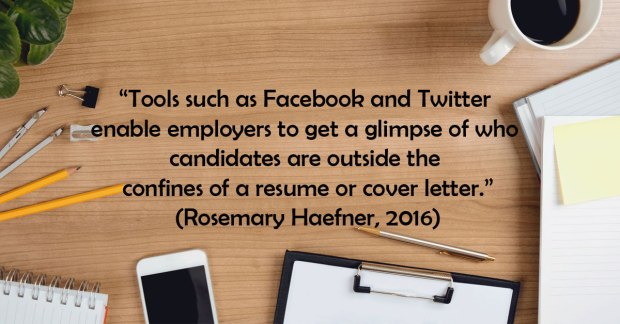
Quote taken from Rosemary Haefner; Background taken from PandaDoc; Compiled by me
I believe as job-seekers, we should use social media to our advantage by showcasing our abilities and skills. Though employers look for reasons not to hire, they’re also checking if you’re the right fit for their company. Values that you’re able to contribute and align with the company are positive towards the business’ culture. (Val Matta, CareerShift)
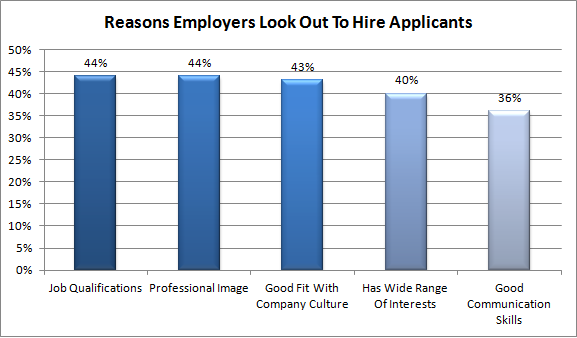
Information by careerbuilder.com; Graph created by me
So how should we develop our authentic professional profile? Personally, I feel that applicants should tune their social media to feature key points that employers look for. This does not necessarily mean, changing who you are. It simply means, speaking without profanities, refrain from posting inappropriate comments and frowned-upon pictures. One look at an image of you partying ahead, would lead your potential employer to toss your application aside. (Hubshout, 2016)
You wouldn’t want an unnecessary comment to turn you unemployed, right? An example would be like the recent Justine Sacco case.
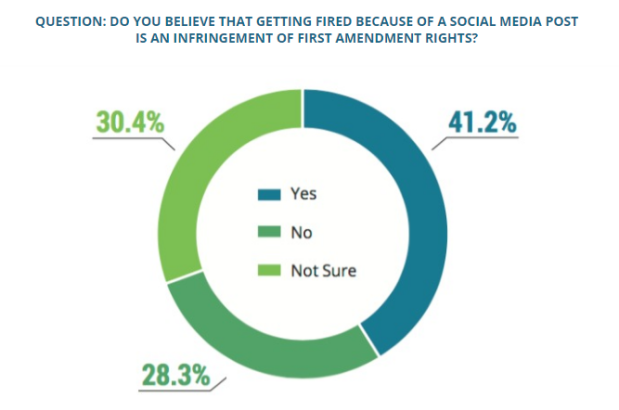
Source: HubShout.com
Though some may think this that this is infringing their rights, I challenge this notion as I strongly believe that one should always remember that after employment, the individual would be representing the company. Thus, any actions that one does may affect the company’s reputation.
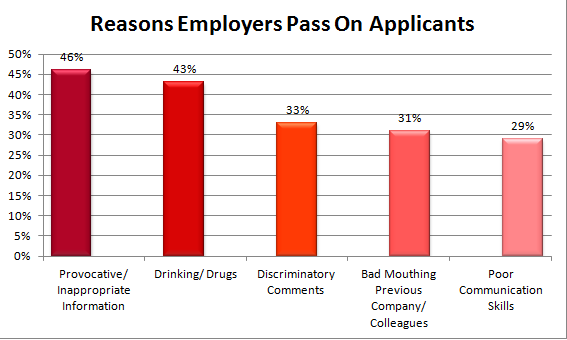
Information by hubshout.com; Graph created by me
Other than social media, blogging may help score you the job. Differing from updating of your daily activities or rants, try keeping a professional blog to bring across the zest you have for things that of importance, which are hard to showcase on a resume. (TheEmployable, 2014)
Some companies use this as training, as it helps them in research, writing well, defending ideas as well as to engage with the world. (Don Tapscott, 2014) By using blogging as your authentic professional profile, you’re in turn allowing the company to consider your views, show that you’re dedicated in making an effort, has the determination to keep up with trends as well as to portray creativity, all that would favour your chances in getting employed.
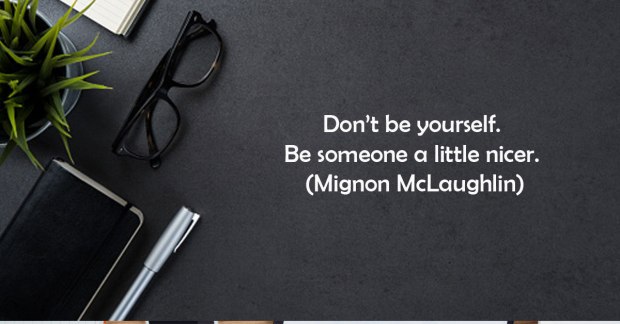
Quote taken by Mignon McLaughlin; Background taken from iStock; Compiled by me
In conclusion, I believe that we may not be able to control the trend of employers viewing our digital profiles; we might as well embrace it. These tools may work to our advantage, giving us an extra “push” in getting a job as compared to the physical resume.
(407 words excluding references and in-text citations)
References:
CareerBuilder. 2016. CareerBuilder. [ONLINE] Available at: http://www.careerbuilder.com/share/aboutus/pressreleasesdetail.aspx?ed=12/31/2016&id=pr945&sd=4/28/2016. [Accessed 9 November 2016].
HubShout. 2016. 2016 Social Media Conduct. [ONLINE] Available at: http://hubshout.com/?2016-Social-Media-Conduct&AID=1732. [Accessed 9 November 2016].
Robin Madell. 2015. The 3 Biggest Social Media Snafus That Can Cost You the Job. [ONLINE] Available at: http://money.usnews.com/money/blogs/outside-voices-careers/2015/06/15/the-3-biggest-social-media-snafus-that-can-cost-you-the-job. [Accessed 9 November 2016].
Amy McDonnell. 2016. 60% Employers Use Social Media to Screen Job Candidates. [ONLINE] Available at: http://thehiringsite.careerbuilder.com/2016/04/28/37823/. [Accessed 9 November 2016].
Don Tapscott. 2014. Five ways talent management must change. [ONLINE] Available at: https://www.weforum.org/agenda/2014/10/don-tapscott-talent-management-millennials/. [Accessed 9 November 2016].
TheEmployable. 2014. How blogging can help you get a job. [ONLINE] Available at: http://www.theemployable.com/index.php/2014/10/28/blogging-can-help-get-job/. [Accessed 9 November 2016].
Jon Ronson. 2015. How One Stupid Tweet Blew Up Justine Sacco’s Life. [ONLINE] Available at: http://www.nytimes.com/2015/02/15/magazine/how-one-stupid-tweet-ruined-justine-saccos-life.html?_r=1. [Accessed 9 November 2016].

Hi Dawn.
Great point you’ve mentioned there, about the employee being a representation of his company! Certainly non-refutable. You brought up the case of Justine Sacco when emphasising the importance to refrain from inappropriate posts online. I’m not sure about her scenario specifically, but what do you think of ‘accidental mistakes’? I mean if a passing comment feels neutral to me, but because of certain circumstances, everything gets blown up. In my honest opinion, I feel that everyone who perhaps shared the “tweet” isn’t behaving appropriately as well. Don’t you think that social media (something that we use to have fun) seems to have become a burden at times?
Talking about social media, should we also “restrict” ourselves on our own personal accounts? I was thinking we’ll never know if a friend becomes our potential employer. Let me know your opinions 🙂
LikeLike
Hi Wan Ni!
Thanks for your comment! I believe that though social media allows us a platform to express our personal opinions and feelings, it is important to be aware of what we’re posting online. Mentioned in the Justine Sacco case, she tweeted tweets that were offensive and probably didn’t think twice about how her actions would affect others. I believe that neutral comments that you mentioned and sharing tweets that you have an opinion about could be limited to an extent, for example, if you’re angry at an issue, you could express your anger by phrasing your comment better, instead of using profanities. (:
Personally, I believe that as social media is more informal, it is perfectly fine for us to have fun on the sites. Though restricting ourselves seems like its a prevention from having a good time, I feel that it’s possible to strike a balance as the possibility may go even further from a friend becoming a potential employer. As our social media is able to be found online and Google doesn’t help to filter our personal and professional sites, any potential employer, be it a friend or not, is able to see what we’re up to on our social media. Hence, perhaps it is better to be safe than sorry of what we post online. (:
Dawn
LikeLiked by 1 person
Hi Dawn!
I agree that social media is a good tool to showcase our personal principles. As it is first and foremost most important to know that someone possesses the Emotional Quotient (EQ) to know how to practice good online etiquette.
I too agree with using blogging as a tool to build an online professional profile. After reading a number of blog entries including yours, I started wondering, if one was to start a professional blog for the sake of GETTING hired, does the blogging stop when they get the job? I think this might be a problematic thinking as if another potential employer comes along, would the ‘dead’ blog create a negative impression instead? My opinion is that one should only start with blogging if they are sure they will be able to keep up and be consistent with their postings. What do you think?
(146 Words)
LikeLike
Hello T. Jones!
Sorry for the delayed response 😛
Yes, indeed blogging continuously seems like a plan that one has to consider carefully before starting. I agree with you and believe that one has to have the discipline to be able to continue posting blog posts regularly to keep the blog “alive”. It certainly isn’t a good impression if any future employers finds the blog “reviving” during certain periods where the individual starts finding for a new job!
Among the different recruitment methods, there are only 7% of recruiters hiring through blogs, thus, I believe that perhaps one should concentrate on other methods to be hired instead of trying to keep a blog which may affect or ruin any opportunities of landing a job in the future.
Dawn
LikeLike
Hey, ho, Dawn! Thanks for sharing your thoughts on the topic. Nice graphics you have made there. I agree on what you’ve pointed about how employees are representing a company with their social networks’ posts too.
However, don’t you think that representation can be a double-edged sword? There are many cases of ex-employees complaining about their unfair firing on social networks, which result in public having doubts against the employers, for example the cases of Marina Shifrin’s “I Quit Girl”(2013) and Buzzfeed’s ex-employee Gaby posting on twitter about being fired and series being ‘stolen'(2016). What do you think of cases like this? Don’t you think that social networks have grown to be very critically accessed by people?
sources:
https://twitter.com/gabydunn/status/741306847294947328?lang=en
http://www.telegraph.co.uk/news/newsvideo/viral-video/10344179/Is-this-the-best-way-ever-to-quit-your-job-Marina-Shifrin-resigns-with-Kanye-West-dance-video.html
LikeLike
Hey, ho, Maureen!!
Thanks for bringing the issue of representation being a double edged sword up! I believe that sometimes, it is inevitable when ex-employees are disgruntled and expresses their feelings of anger through complaints or bad mouthing on social media. Though we can’t control what they’re saying online, it is critical for the company to address this issue by explaining and clarifying about any matters regarding performance, terminations and so on, to their employees.
For example, if an employee complained that they were fired without warning, such as in the Buzzfeed case that you mentioned, companies should explain to their staff that they would usually give clear warnings and chances to improve before the final decision in allowing the employee to be let go. The company would certainly, not want their staff to end up with wrong assumptions. If there is nothing wrong, there is nothing to hide. By treating employees with dignity and respect, they will know through their personal experiences.(:
Thanks for your comment!
Dawn
LikeLike